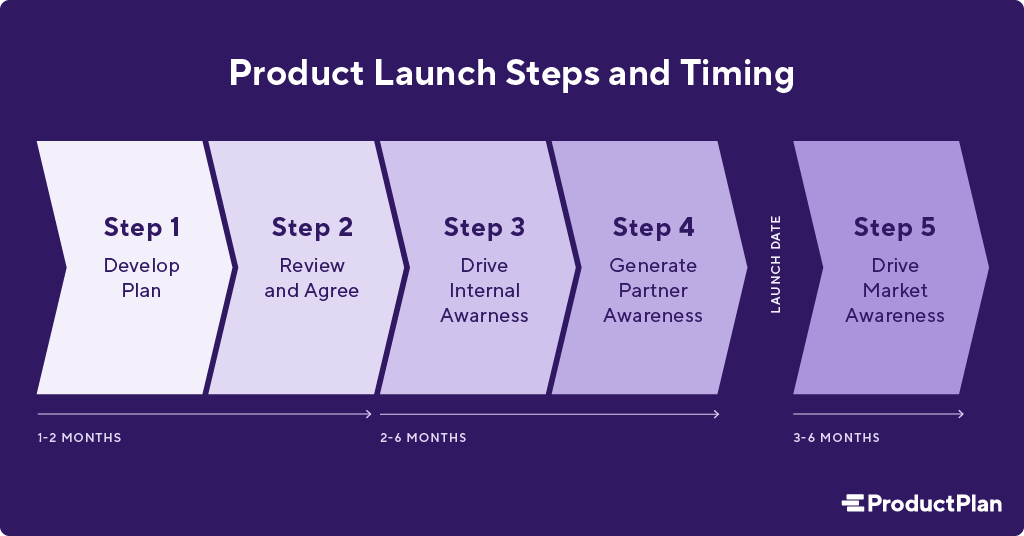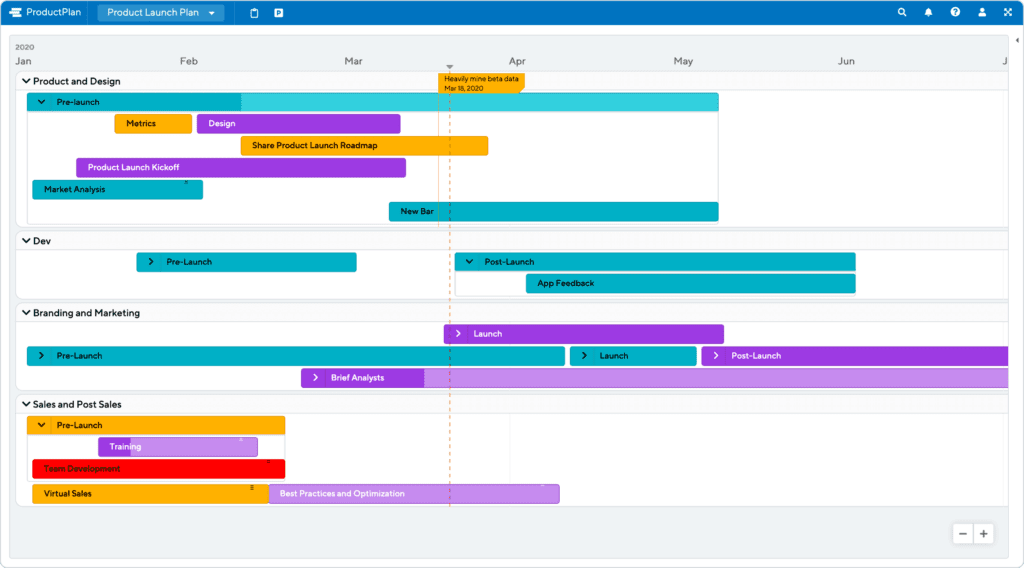A successful product launch can create significant benefits for a company. In addition to generating revenue, a launch can build anticipation and market awareness for the product. It also provides feedback from early users, which the product team can use to improve the product. First, however, you need a product launch plan roadmap.
Creating a successful product launch requires planning and coordination across many departments throughout the company. Because it’s such a complex and strategic undertaking, you will want to develop your product launch plan using a strategic roadmap.
Learn the Anatomy of a Product Launch ➜
The following are some tips and strategies for developing a practical product launch roadmap.
How to Create a Product Launch Plan Roadmap
1. Reacquaint your team with your user and buyer personas.
As they developed the product, the day-to-day details of the product launch temporarily diverted your cross-functional team’s time from learning the product’s personas.
While you prepare your product launch plan, this is the time to familiarize yourself with those people. Getting reacquainted with your target users and buyers will help you with several aspects of your launch plan. This knowledge will then inform where to focus on market-awareness campaigns, which publications your public relations team will talk to about your new product, and more.
While you and your team study these personas, address what they care about, which of their problems you developed your product to fix, and where they spend their time.
2. Remind yourselves about the “why” behind your product.
Like every other strategic undertaking you drive as a product manager, your product launch will have limited resources and budget. To maximize the impact of your launch, you will need to direct those limited resources into those strategies and channels that will have the most significant impact.
For example, you’ll want to identify the most compelling messages about your product’s value proposition—the “why” behind why you built it and for whom. Then, using those high-level messages will help you cut through the noise and make a case for the product to your user personas.
3. Make sure you have the right tool to build your roadmap.
A product launch is such a complex initiative that involves contributions from many teams across the company. Therefore, as you present your launch roadmap to these various teams, you should be prepared to focus on different details of the plan with each team.
Also, because product launch plans can span six months or more, you should assume that details in the plans will change over time.
With these things in mind, you will want to use the right tool to develop, share, and update your product launch roadmap. That tool should be a web-based app explicitly built for roadmaps.
4. Keep your roadmap’s contents brief, high-level, and jargon-free.
A roadmap is a strategic blueprint that represents the high-level plans and goals for an initiative. For example, your product launch roadmap should not be a detailed to-do list. Instead, you will use other tools, such as project management apps and your product backlog, to create and track the individual tasks your team agrees on.
You will also want to limit the amount of department-specific jargon you include on your roadmap. Remember, the cross-functional team driving your product launch includes marketing, sales, customer support, development, and other stakeholders. These departments all have a unique language.
Keep your roadmap’s contents as free as you can of these internal terms and abbreviations. You want everyone on your cross-functional team to understand your launch plans at a glance.
5. Create a timeline for your product launch plan.
Because it will tie to the product’s planned release date, your product launch plan should be built on a timeline working backward from that date. This timeframe is usually six months.
As you can see from our product launch roadmap template above, the first months of a six-month launch roadmap represent the early stages of planning and research. The marketing team begins working on product branding and messaging, for example. Over the next couple of months, product management finalizes its pricing model while the sales and post-sales teams conduct training on the product. As the launch date nears, the cross-functional team will complete many additional milestones. These milestones include launching a beta version to early users, briefing industry analysts, building the process for CRM, and lead reporting.
The product management training company 280group outlines a product launch as a six-month initiative as well. They divide the timeframe into the following six steps:

As you build your product launch roadmap, you might want to develop your plans using 280group’s six-step model.
6. Use roadmap swimlanes to divide responsibilities.
If you look again at the launch plan roadmap template above, you’ll see this roadmap divides responsibilities into four swimlanes:
1. Product/service management
2. Branding/marketing
3. Channel management
4. Sales/post-sales
These swimlanes help teams or individuals contribute to the product launch in any way to and easily find their responsibilities and each job’s timeframe.
7. Build in a review process and timeframe for each initiative.
Your launch roadmap should also include dates that indicate when feedback from the team must be collected, reviewed, and agreed upon before the team can consider that milestone complete.
This preparation will help ensure that all major projects in your launch plan receive the review and scrutiny they deserve before your team deems them ready. It will also help keep everyone focused on gathering relevant information and formulating their opinions. Then, during these reviews, your team can have productive conversations that lead to intelligent decisions.
8. Include the product metrics you’ll be monitoring post-launch.
You should also include in your launch roadmap the specific metrics you will use to determine whether or not your product launch is a success. It will align everyone’s focus and make sure everyone on your cross-functional team knows what the team is striving for. Keep the team working toward the optimal outcome: a successful product launch.




